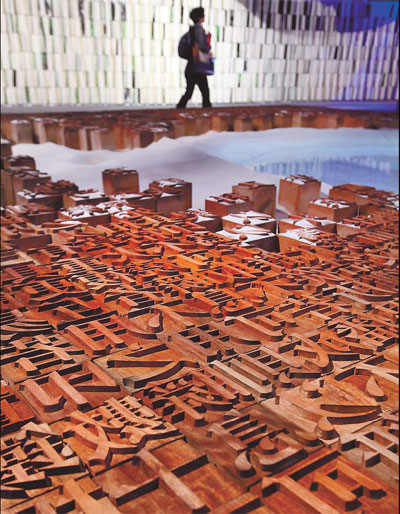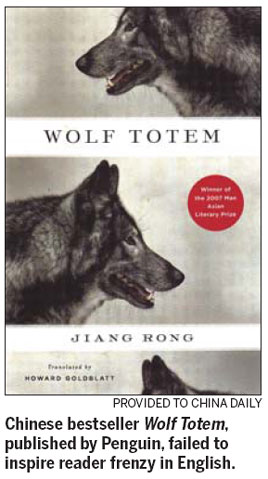Chinese literature is attracting increasing attention at globalevents like the Frankfurt Book Fair in Germany. Provided toChina Daily |
Chinese authors are still struggling to carve a niche in the global gallery of contemporaryliterary greats. Chitralekha Basu reports.
Jo Lusby, who heads Penguin in North Asia, was recently quoted in Shanghai's Oriental Dailyon the subject of Chinese literature and Western expectations. Buying Chinese fiction for theoverseas market, she said, was not necessarily about picking the best, or the bestsellers.Rather, it was about "what piques the interest of the Western reader".
Looks like moral tales about corruption among bureaucrats, angst-ridden teenagers living it upin wild Shanghai and the "cultural revolution" (1966-1976) will dominate the Chinese list ofWestern presses for a while. Or will it?
While Lusby's comment might read a bit too focused on the market, Paul Richardson, chairmanof China Publishing Ltd, the United Kingdom, and member of the advisory board of the ChinaBook International, feels, "Lusby has been the publisher most committed to the wider diffusionof Chinese writing in the West." ("Apart from the UK-based literary agent Toby Eady,"Richardson hastens to add.)
"Of course, one must be ready to innovate and take risks on new things that one believes in,but you also have to know what your market is ready to accept - whether in the UK or China.
"Penguin has the reputation and recent track record of publishing very good quality books that,mostly, also sell well," Richardson says.
Good sales are a relative idea. The last book to have notched up outstanding sales in theEnglish-speaking market is Shanghai Baby by Wei Hui (translated by Bruce Humes/RobinsonPublishing UK) in 2001. The somewhat morbid tale of a waitress-turned-writer of erotic novels -torn between an artist who overdoses on heroin and a German businessman who she knows ischeating on her - is thought to have sold over 300,000 copies.
Going by more conservative projections, a Chinese book that sells 5,000 copies in English issupposed "to break even", according to Huang Youyi, vice-president of China InternationalPublishing Group (CIPG) and secretary-general of the Translators Association of China. "Occasionally when a book goes beyond 10,000 copies, it is considered a great success."
So far it is only the Chinese classics like A Dream ofthe Red Mansions, Three Kingdoms, Journey to theWest and The Outlaws of the Marsh that have"enjoyed such continued sales", he informs.
Great hope was pinned on Jiang Rong's Wolf Totem- a tale set in rough, weather-beaten Inner Mongolia,told from the point of view of a sent-down youth inthe wake of the "cultural revolution" - especially afterthe English translation by Howard Goldblatt took thefirst Man Asian Literary Prize in 2007.
The book sold over 4 million copies in Chinese butfailed to inspire similar reader frenzy in English. "Penguin paid a record advance, but it sold only invery small quantities in the UK and the US, though itdid sell well in English in the Asia Pacific region,"Richardson says.
"Everyone's looking for the Chinese bestseller butwe're not there yet," says Marysia Juszczakiewiczwho founded Peony Literary Agency. "But that's notwhy we're in this business," she clarifies quickly.
Her haul for the year includes sought-after authorChan Koon-chung (The Fat Years, an Orwellianvision of China emerging as a superpower, set in thefuture, is being translated in 11 languages). YanGeling's 13 Nanjing Heroes, about the sex workerswho volunteered to replace university students asescorts for invading Japanese soldiers during thesiege of Nanjing in 1937 - Zhang Yimou has just wrapped up his Christian Bale-starring filmbased on the book - will be published by Random House in January 2012.
"Han Han's got a two-book deal with Simon and Schuster, a novel and a book of essaysshowcasing the variety of voices in China, its history and contemporary reality," she adds.
"It's time the Western reader had a change of diet," Juszczakiewicz says. "My main interest is toshow the West the variety of writing that exists and is developing in China, the variety of genresand voices, but at the same time the chosen text will have to work in translation. Now really isthe time to move beyond 'cultural revolution' and scar literature and showcase the variety ofdepth and voices coming through."
"The focus is still pretty much on the 'cultural revolution', ethnic groups and rural China.There's a lot of good writing mainstream publishers won't take up," says Harvey Thomlinson,who founded the Hong-Kong-based Make-Do Publishing essentially to provide a platform to"writers with independent voices, ambitious to come into their own".
Thomlinson has translated and published Murong Xuecun's Leave Me Alone Chengdu -originally an existentialist blog post about the erosion of values in entrepreneurial urban China.
The book, which inspired a cult following in China, has since been published in 10 countries,and is highly visible in stores in Malaysia, Thailand and Singapore.
The English version of Li Er's The Magician of 1919, due out in September, is again, "tooavant-garde for any mainstream publisher to be interested in," feels Thomlinson. Set in Beijingin the grip of a nationalist upsurge in the wake of May 4, 1919, in The Magician, Li revisitshistory through the prism of fantasy and twists around the linear narrative.
The unsparing, black humor, often replete with scatological references - the sort that marks LiEr's writing and, indeed, that of his slightly-older contemporaries, Mo Yan and Yu Hua - is oftendifficult to translate across cultures, Thomlinson points out.
So what gets picked instead for overseas publication is often tracts of "literary, sophisticatedprose, which is, in essence, bad literature. It does not reflect the resounding spontaneity thatmarks some of the new Chinese literature".
The hard truth is that while Chinese art and cinema have managed to impress Westernaudiences, Chinese literature is yet to carve its own niche in the global gallery of contemporaryliterary greats.
"No recent literary books from China have made a major impact in the UK - none for instance inthe top 250 new books published in 2010 and probably none in the top 2,500," Richardsonsays.
According to Christopher Mattison, formerly executive editor at Zephyr Press who is nowstarting up a new publishing venture at Hong Kong City University, "Among the new titles beingpublished in the upcoming fall season by 100 independent presses based in the US and UK ...there are (only) 17 books translated from Chinese out of well over 500 in translation."
Only one of these books is by a contemporary author and the other three Chinese titles are re-translations of Tang classics and a "definitive" Confucius, he informs.
Huang of CIPG concedes, "No matter whether people want to read classics or contemporaryliterature, the actual number of buyers of our books are limited."
So the strategy is to try and include something for every potential reader interested in China:Lu Xun's Commentaries on History (translation by Tang Bowen/Foreign Language Press), the12th-century classic by Hong Mai, Records of the Listener: Selections of Chinese SupernaturalStories (translation by Alister D Inglis/FLP), and Real Life Stories of Migrant Workers and UrbanTransplants (An Dun/New World Press), to name a few.
"It's not as if we have a dearth of good Chinese writers, or works that deserve wider attention,"comments Jackie Huang, Beijing representative of the literary agent, Andrew NurnbergAssociates International. "But there is a language obstacle and culture gap between the Eastand the West. It takes time for non-English readers to get interested in Chinese life. They canenjoy reading Chinese books in translation only after they have some idea about the culture."
And I thought people read books to find out about other cultures. Sounds like a classic chicken-and-egg situation.
(China Daily 07/15/2011 page22





No comments:
Post a Comment